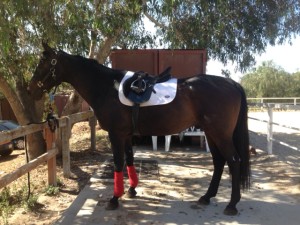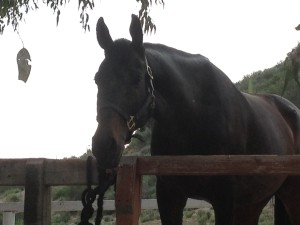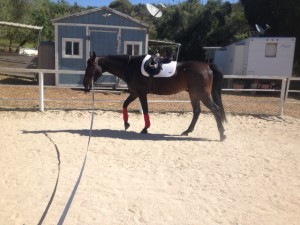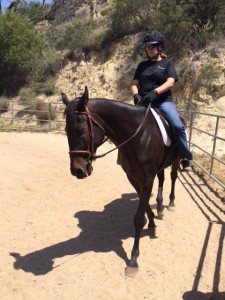Apollo is a Thoroughbred who we adopted out two years ago to a wonderful couple. A few months ago we received a call from the new owner saying that Apollo was bucking and did not seem happy, so I went down to see if I could help. One of our philosophies at Hanaeleh is that we have a lifetime interest in the horses we adopt out- not only do we have a first right-of-refusal, we have on several occasions stepped in to help the new owners with temporary housing, retraining, trailering, or in other ways when they are having difficulties.
One of the reasons we got Apollo was because his previous owner was afraid of him, and did not ride him. He languished in a box stall, and not surprisingly, when the previous owner tried to ride him with no muscle tone and no regular work, he bucked. She did not tell me that he bucked, however, until AFTER I had gotten on him and he went on a wild bucking rampage. Luckily I stayed on, but I was very unhappy about the subterfuge that literally could have gotten me killed. After taking Apollo to Hanaeleh, we spent several months getting him comfortable and safe to ride. So when I was told that he was bucking again, I was concerned that some similar issues had resurfaced.
When I went out to see Apollo, it was pretty clear that he was in a great deal of pain. He would flinch when I touched his back, and when I watched him move at liberty (moving in the arena without being ridden or on a longe line), he held up his neck so high that he literally was throwing his feet out in front of him. A horse should move from his hind, and while I expect that some horses hold their necks up higher than others, it was pretty clear to me that he was in pain and putting his neck up at an unnatural angle was his attempt to avoid that pain. In addition, Apollo was very food aggressive, even though he was at a good weight.
I was concerned for several reasons, but I questioned the fact that the trainer had never mentioned his unnatural movement, and did not discuss saddle fit with the owner, either. I personally believe that one of the jobs of a trainer is to ensure that their clients have proper fitting tack and also to discuss any potential behavior or pain issues with their clients. From what I understand, although Apollo had often bucked during lessons, the trainer never looked at the saddle to ensure a good fit, nor did he address the (what I consider obvious) unnatural movement and pain issues. I believe that sometimes trainers refuse to acknowledge that some horses just are unable to do more advanced movements, and, instead of having a candid conversation with the owners, they will continue to push the horse to do things that he either cannot or does not want to do.
I spent the afternoon with the owner and encouraged her to call the chiropractor and perhaps a massage therapist, and told her not to ride Apollo for a few weeks. The chiropractor came out a few days later, and, without even watching the horse move (or, again, without looking at the saddle fit), told the owner to ride Apollo the next day. This, I feel, was quite negligent of him, and I was very disappointed in hearing that he never watched Apollo move, but merely adjusted Apollo in the stall and left. When the owner took his advice and rode Apollo the next day, she was thrown and knocked unconscious. Her head injuries were quite severe, and even though several months have passed, she still is in recovery. If she had not been wearing a helmet, she would not have survived the fall.
In the middle of dealing with head trauma, the owners also wanted to continue to investigate Apollo’s pain issue. The vet was not sure where the pain was radiating from, and said he would like to see someone ride him to determine how he moved under saddle. The owner asked her trainer to help, but the trainer refused, telling her that he felt Apollo should not be ridden, and she should just get rid of him and get another horse. Oddly enough, a week before, he did not appear to feel this way, and had no problem taking her money for a lesson. In the meantime, we had offered to bring Apollo back to Hanaeleh to help him rehab while the owner also recovered. No longer having the support of the trainer, and dealing with doctor’s visits and rehab, the owners brought him out to Hanaeleh, where he has been for the past few months.
To help with Apollo’s food aggression, we fed him hay and pellets several times a day, almost double the amount of food that he would normally receive, for several weeks. At first, he ate every morsal, but eventually he began to get choosy about his food choices. We started tapering off of the food, first with the pellets, and then with the hay. We have done this with a few of our horses, mostly those with high metabolisms, multiple times. I believe that horses with high metabolisms (Thoroughbreds, Arabians, etc.), even though they might get all the nutrition they need and might be at a good weight, often still feel hungry with only two flakes of hay a day, and may need more forage than other horses to feel “full.” We still give Apollo a little extra Orchard hay to fill his tummy, and somehow knowing that there is enough food allows him to eat more slowly. While he certainly enjoys his food, now he doesn’t lay his ears back or threaten when he is fed.
In the arena, our first goal with Apollo was to help him move more naturally. We encouraged him to relax and to walk at liberty in the arena and round pen. We did not press him to trot or canter, for even at the walk he was uncomfortable. For the first few weeks, we were lucky if Apollo relaxed even once at the walk. Eventually, he started to bob his head and relax a little, so we added the trot. Again, at first Apollo was stiff and his head was held unnaturally high, but after six weeks, he finally moved more normally, with his head lower. He began to stretch his neck and back out on his own, and seemed more comfortable. When Apollo moved well at both the walk and the trot, we asked him to canter; again, at first his head was unnaturally high, but he began to relax and put his head down at that gait as well. His owners came out several times a week, working on the same strategy to get him comfortable and pain-free . They worked him in the arena and helped to stretch out his neck and back with “carrot stretches.” We got Apollo out and worked him when his owners were unable to come out.
Once Apollo started to move more freely, we began to longe him first with a sircingle, and then in a saddle. We used a Wintec all-purpose saddle with a medium gullet, and a basic square pad. We were prepared to tweak the saddle to ensure that it fit correctly, but were pleasantly surprised to see an even sweat pattern. He seemed fine with the saddle, so two weeks ago we got on him in the round pen and rode him at a walk and then a trot. He was calm and comfortable during the ride, so today we decided to ride him in the arena.
“Lazy” is the word I would use to describe Apollo today, which is a far cry from “stressed” and “painful” of a few months ago. He was relaxed and stretched his neck and back when we longed him at liberty, and when I got on him, he was nonchalant about the entire affair. First we walked, then we trotted (he was still lazy), and, finally, I asked for the canter. He rushed into the canter on the first time out, but when I brought him back down, he went into it nicely. He took both leads well, and did not indicate any pain, stiffness, or stress that he had before. In fact, once we began cantering, he decided he was having quite a bit of fun, and I had to be a little strong to get him to transition down to the trot. Again, there was no bucking or indication or pain.
I finally had to stop riding because of time constraints (we still had three horses to exercise in the arena), but I confess I did not want to get off- Apollo truly is a joy to ride. He was calm and willing, and if I saw him or rode him today without having known of the past few months, there was nothing that would have made me believe that he had any issues. We will continue to ride him and work him both in the arena and on trail, but I believe that as long as he is ridden in a well-fitting saddle, and he is not asked to collect for long periods of time, he will be happy and safe to ride. We will update on Apollo in the future, but for a horse who the trainer said “should not be ridden” I will say, he was remarkably fun to ride.

Apollo under saddle.






